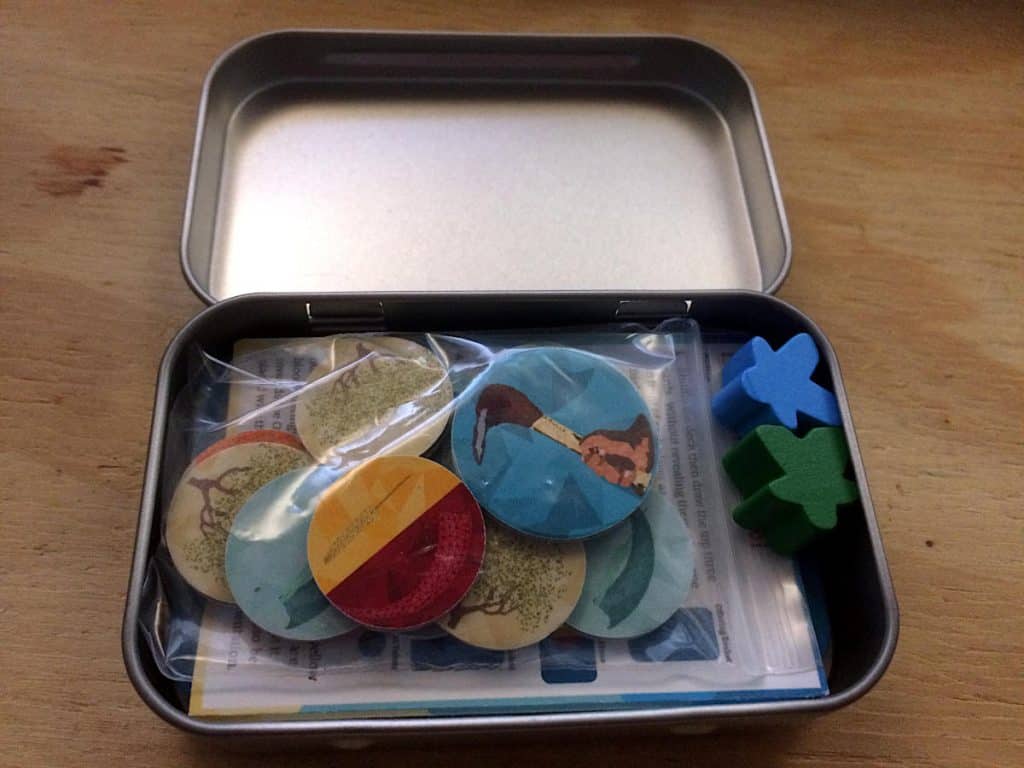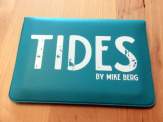| Release Date: 2024 | Players: 2 (only) |
| Designer: J.L. Reid | Length: 30-45 minutes |
| Artist: J. L. Reid | Age: 14+ |
| Publisher: self-published | Complexity: 2.5 / 5 |
| Plastic (by weight): < 1% | Air (by volume): < 5% |
As the first two sons of Adam and Eve, a lot of responsibility had been laid upon our shoulders. We were a farmer and a shepherd who had to offer our harvested grains and livestock to God. We were never sure if either of us was in His favour. So we carried on and made wilder and wilder boasts about our gifts to Our Lord until it was too much and one of us struck down the other. We were Like Cain and Abel by J.L. Reid from Bent Pin.
Listen to the Audio Version
Intro Music: Bomber (Sting) by Riot (https://www.
Sound Effects: bbc.co.uk – © copyright 2024 BBC
The Desert Planet (feat. Udio) by Sascha Ende
Free download: https://filmmusic.
License (CC BY 4.0): https://filmmusic.
Tiny Epic Trick-Taking
So here is a game that has ambitions on a biblical scale. Yet, its boasts are rammed into nothing more than a small mint tin, which creates an odd dichotomy for this two-player trick-taking game. I always felt that great things can come in tiny packages, but to set your game against an origin story that is second to only the beginning of Earth itself, life itself even, is bold indeed. So you can probably understand why my interest was piqued when the designer approached me and showed me the rules.
I was immediately sold on the fact that Like Cain and Abel would come in a mint tin. I love mint tin games and I’ve seen many different ways to squeeze the most out of such a physically limited space. Yet, here isn’t just a mint tin game, but a trick-taking game as well. With my excitement about this recently burgeoning genre, there were now two reasons to take a closer look. Those two reasons were quickly joined by a third when I read the rules. I saw that the cards have two different numbers at each end, which represent two different suits, and that you can play cards facing either way, making these cards effectively multifunctional.
Like Cain and Abel is completely different to everything I’ve seen before for these three reasons alone. However, being new and mixing up different genres and mechanisms doesn’t make for a good game. Yet, I couldn’t wait for the review copy to arrive and for me to get the game to the table.
Like Cain and Abel in Short
Let me give you a very brief outline of how Like Cain and Abel works. The deck of 18 cards is shuffled and dealt evenly to both players, but not until after you have removed three cards unseen. One of them goes in the middle as the so-called offering stone and one goes in front of each player representing their offering basket. That creates a little uncertainty as to what cards are in play.

Get yourself a wooden Tabletop Games Blog dice tray.
Each tray is the perfect size to roll your dice, and with the soft mat, it’s really quiet, while the wooden frame makes it wonderfully sturdy.
After that, players choose one of their cards and place it face down in one of the two possible directions in front of them. The side facing towards the opponent is their bet on which colour they will the most tricks of and the number are the points they stand to win this round if their colour prediction is correct. So if you place a high-value card into your offering basket, you stand to gain a lot of points, but you then have one less high-value card available to win your tricks with. That’s your first challenge as a player.
The situation is made a bit more complicated by the fact that players secretly draw a random favour token before they place their bet. This token decides if players get any points at all this round, irrespective of whether their bet is won or not. So if the favour token goes against you, you don’t have to play a high card. Your main goal is to prevent your opponent from winning their bet.
Boasting, Bluffing and Betting
There is also a boasting phase, where you can bluff about what bet you placed, but let’s ignore that for now. All it does is allow you to gain the so-called last act token which lets you remove the points of one of your opponent’s won bets. I recommend you don’t worry about it in your first few games. There is enough going on as it is.
The core game is all about using your hand of cards wisely. You want to win the most tricks of the colour you placed face down at the beginning of the round. That is, you don’t only want to win more tricks of that colour than your opponent, but also more tricks than the opposite colour that you win. It’s not as easy as it seems, but then, life for Cain and Abel wasn’t easy either.
To complicate matters further, each trick consists of three cards and there is no need to follow suit. All that matters is that subsequent cards played into the trick have a higher number value on them. That’s where a small element of ladder climbing comes in, adding yet another mechanism to this already eclectic mix. However, the mix of trick-taking and ladder climbing is actually very interesting.
The thing is, if the player who is playing the second card has a higher value in their hand, irrespective of colour, they are forced to play it. The third card is optional though. So because cards have two different ends to them, you sometimes have to play a high-value card of the opposite suit that you were planning to play it for. It is very possible for an opponent to tease out strong cards and waste them on tricks that you don’t actually want.

Numbers
Like Cain and Abel is a weird game, but one that weirdly works. Players have no way of guessing what colour the opponent placed into their offering basket, let alone if the opponent’s favour token is in their favour. All you can do is win the most tricks of your chosen colour or failing that, make sure your opponent gets an even split of tricks so you ruin their bet. However, once you played the game a few times, you start to realize that there is a lot of depth to it. With practice, you can play really skillfully.
You do need to learn the deck of cards though. The numbers at opposing ends both go from 1 to 18, but they aren’t symmetrical. So it’s not like one end counts upwards from 1 to 18 and the other end down from 18 to 1. The numbers are jumbled up intentionally though. If it was a linear relationship, then it would be easy to choose which colour to put in your offering basket. You simply choose whichever suit has the higher numbers. However, because the numbers are mixed up, your choice is a lot harder. You might end up with a hand that has an even split of strong cards of both suits. A lot of thinking and playtesting has gone into Like Cain and Abel to get to this point.
The only slight concern I have is with the random selection of favour tokens. It is possible for one player to only draw tokens that are against them, meaning that they will be unable to score any points whatsoever throughout the whole game. Of course, luck should even out over the five rounds that you play, but it is possible and something to bear in mind.
Judges
I certainly have fallen in love with Like Cain and Abel. It’s maybe not quite as epic as it makes out to be, but it still is a lot bigger than the small box it comes in. The game has found a special place in my heart. Even though there are some rough edges, like the rulebook’s many different terms, such as offerings, covenants, boasting and favour tokens and the randomness of the just-mentioned favour tokens, it is still very clever. It’s a game I want to play a lot more, because I can see that there is a lot more to it. It’s the sort of game that you need to play a lot to really master.
So if you want a trick-taking game that comes in a small box, plays relatively quickly and clearly has a lot of new twists and a lot to offer, then please take a closer look at Like Cain and Abel. You could easily reap some huge rewards as a result.
This blog is free for everyone, but if you'd like to support it, here are some options.
Useful Links
- Like Cain and Abel Kickstarter page: https://www.
kickstarter. com/ projects/ bentpin/ like-cain-and-abel-an-18-card-trick-taking-and-bluffing-game - Rulebook: https://drive.
google. com/ file/ d/ 1CyG0hIkO4IuqdSmXuq6uSDGysNYDYoT2/ view - Bent Pin: https://www.
thebentpin. com/ - BGG listing: https://boardgamegeek.
com/ boardgame/ 414512/ like-cain-and-abel
Transparency Facts
I feel that this review reflects my own, independent and honest opinion, but the facts below allow you to decide whether you think that I was influenced in any way. Please also read my Ethics Statement for more information.- I was given a free review copy of this game by the publisher.
- At the time of writing, I have not received financial support from the publisher or anyone working on their behalf.
Audio Version
Intro Music: Bomber (Sting) by Riot (https://www.
Sound Effects: bbc.co.uk – © copyright 2024 BBC
The Desert Planet (feat. Udio) by Sascha Ende
Free download: https://filmmusic.
License (CC BY 4.0): https://filmmusic.
Playlist
These are the songs I listened to while I was writing this review:





